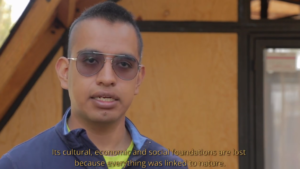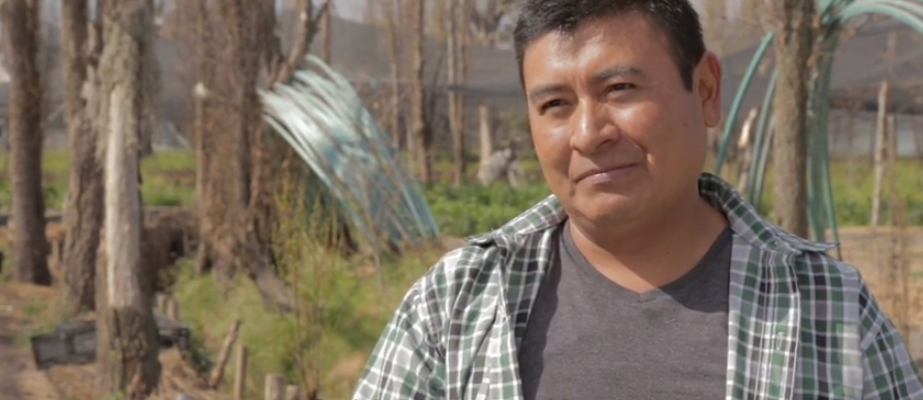A group of researchers from the STEPS North America hub have produced new resources for participatory research in socio-ecological systems. A short film and an accompanying publication draw on the team’s extensive experience of working with individuals and stakeholder groups in the urban wetland of Xochimilco, Mexico City. The results will be useful for any groups looking to facilitate similar processes in their own contexts.
The wetlands of Xochimilco and the traditional agricultural areas within it are undergoing rapid change and degradation. There are various reasons for these changes and opinions are divided on the best way forward to tackle the associated problems. The North America hub team has been working to help alleviate this stalemate, over a period of more than three years, as part of the Pathways Network project. To navigate towards a more sustainable future for the socio-ecological system of Xochimilco, the team explored the possibility for new kinds of agency among the various stakeholder groups.
Voices of Xochimilco

‘From Being Rooted to Uprooted, and from Trapped to Transformed’(‘Del desarraigo al arraigo, y de las trampas a la transformación: Voces de Xochimilco’) is a film that captures the perspectives of a sample of people whose lives are intertwined with Xochimilco’s wetlands in various ways: these are the ‘voices of Xochimilco’ alluded to in the film’s subtitle.
As the film unfolds, what becomes apparent is that many people agree the area is in need of transformation, but there are diverging views on the nature of those problems. Among the voices is that of Patricia Perez Belmont, a doctoral student at UNAM, who summarises a key challenge for determining the future of the area:
‘Everybody inside or outside Xochimilco, or those who want to do something for Xochimilco, are pulling in many directions, and there isn’t a shared vision.’
A narrative and methodological guide
In this sense, the film sets the scene well for an accompanying publication. This comprehensive, illustrated guide (available in Spanish and English) aims to support participatory research looking for transformative pathways to social-ecological system sustainability. Drawing on the North America Hub’s unique research approach, the authors offer activities with practical examples to help researchers creatively explore new ways for participants to relate to each other and to their environment.
Transformation Labs (T-Labs) in action
The guide includes a methodological description of the activities developed in Xochimilco as part of the Pathways Network project. The Transformation Laboratory (T-Lab), is a method designed to address problems in which society and ecology are entangled. T-Labs seek to explore the perceptions and experiences of individuals through continuous dialogue, to identify and articulate ways to connect worlds and perspectives. Subsequently, the activities in this guide are not designed by the traditional approach of problem analysis and planning. Instead, they are designed to help link personal and collective experiences in a creative and responsive way.
The guide’s innovative design helps the reader navigate the practical resources by highlighting the objectives and methods for each activity. The activities appear in the order they were carried out, to generate a process of sharing, talking and exchanging perceptions and experiences. The annex section contains further guidance, indicating the duration and suggested materials for the activities.
Narrative and general results (‘it’s not just about acquiring knowledge.’)
The guide presents an illustrated timeline along which are placed the project’s various activities. Another diagram illustrates the objectives addressed by each activity, and whether it is aimed at individuals or to foster the interaction of the group.
Finally, the authors offer some concluding remarks on the general findings of the almost three-year process. They observe a shift in attitude among the participants, who came to recognise the significance of how they related to one another. The guide concludes with a quote from Ingrid Estrada (founder and director of INANA AC), on the occasion of the participatory methodologies workshop in February 2019, which encapsulates something of this relational development:
‘[F]rom here we can learn, from living, experiencing, unlearning/ reflecting, never alone, always in dialogue. It’s cyclical, it’s not just about acquiring knowledge.
We’re here, we all are looking for someone else to solve our problems, there are those that pull us in different directions and people who struggle to maintain the essence of this place. What is it that we want: Support for one another, community, hoes, work, equity, water, ciento, planting. Without wanting to we all look in one direction, maybe it won’t resolve our problems, but we always go about solving them as a community.’
The overall aim of this guide is to help facilitate similar processes in different contexts. It should be useful to any groups who genuinely are committed to the sustainability of the social-ecological systems they inhabit.
Read more
The North America Sustainability hub is carrying out transdisciplinary research focused on improving the management of water resources and water resource-related risks (such as flooding and scarcity) in urbanized areas. The hub is hosted by Arizona State University (ASU) working in partnership with the National Laboratory for Sustainability Sciences (LANCIS), housed at the National Autonomous University of Mexico (UNAM).
The PATHWAYS Network carried out comparative research in six countries to explore how to work with local people on social transformations in the context of environmental change. The teams conducted ‘Transformation Labs’ (T-Labs) with diverse groups in each country to address a specific socio-ecological problem.
